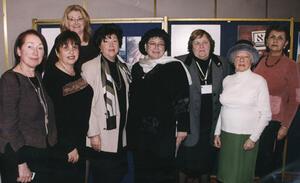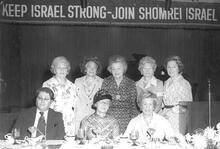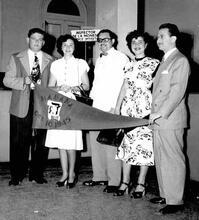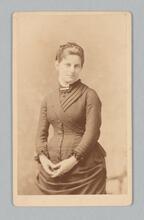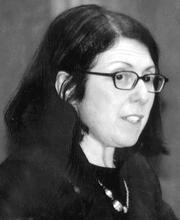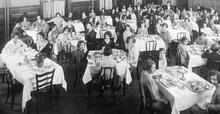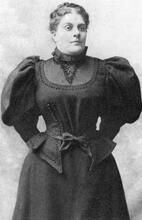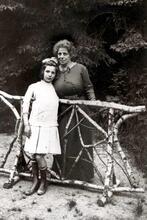Emunah
The religious Zionist women's organization Emunah aims to provide education and Jewish values to children, young women and new immigrants, and to enhance the status of women and family life in Israeli society. Pictured here are members of the World Emunah administration in December 2003 (L to R): Hadassah Zlotack, Dina Waxman, Leah Aharonov, Mina Fenton, Rachel Lifshitz, Chana Melamed, Yehudith Kovno and Delila Harnu.
Institution: Yehudith Huebner.
With a network of more than one hundred local chapters across Israel and a membership of one hundred thousand (eighty percent volunteers), Emunah Israel organizes programs for many sectors of the community. It was founded in 1935 as the Women’s Branch of Ha-Po’el ha-Mizrachi. World Emunah, which has its headquarters in Jerusalem, is the umbrella organization of Emunah affiliates throughout the world and aims to strengthen global commitment to Israel in communities abroad. Since its inception, Emunah’s goal has been the advancement of social welfare in Israel. Emunah has over the years had three Knesset members as part of the National Religious Party faction.
Founding and Goals
Emunah was founded in 1935 as the Women’s Branch of Ha-Po’el ha-Mizrachi, under the leadership of Tova Sanhedrai-Goldreich, who served the public throughout her life, first as a young woman in Poland, later in Israel, and as the leader of Emunah for more than fifty years. In addition, she served as a member of Lit. "assembly." The 120-member parliament of the State of Israel.Knesset on behalf of the National Religious Party, as well as Deputy Speaker of the Knesset, from 1961 to 1974 (the fifth, sixth, and seventh Knessets). Du,ring the 1960s, the Women’s Branch merged with the Mizrachi Women’s Organization to form the National Religious Women’s Organization, which later assumed the name Emunah.
Emunah aims to provide children in Israel with a broad education and strong Jewish values through a network of day care centers, children’s homes, high schools, vocational schools, and a women’s college; to absorb new immigrants into Israeli society; to strengthen the family unit through family counseling services and parenting groups across Israel; and to enhance the status of Israeli women and Jewish family life.
World Emunah
World Emunah, which has its headquarters in Jerusalem, is the umbrella organization of Emunah affiliates throughout the world. It was established in 1977 by its then president Sarah Herzog (Riga 1896–Jerusalem 1979) and chairperson Eva Adelman (USA 1934– Jerusalem 1997). World Emunah today has a membership of thirty thousand, with branches in nearly thirty countries worldwide, including Argentina, Australia, Austria, Belgium, Brazil, Canada, Chile, Costa Rica, France, Gibraltar, Georgia, Great Britain, Hong Kong, Ireland, Italy, Mexico, Panama, Peru, Russia, South Africa, Spain, Switzerland, Sweden, Ukraine, United States, Uruguay and Venezuela. These branches create and maintain projects in Israel and strengthen their commitment to Israel in the Lit. (Greek) "dispersion." The Jewish community, and its areas of residence, outside Erez Israel.Diaspora. Their efforts are coordinated and supported by World Emunah and the World Religious Zionist Women’s Organization in Israel.
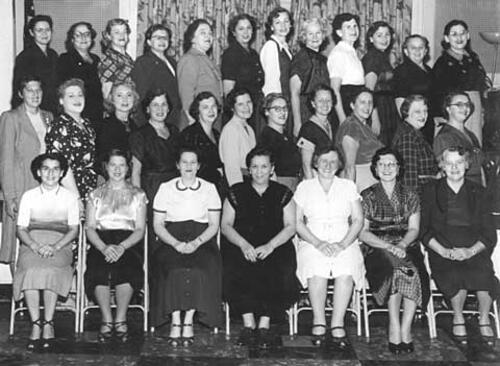
The "Yankee" Jewish women of the first half of the twentieth century created the infrastructure of American-Jewish women's organizational activities. The founding of synagogue sisterhoods began with the Reform National Federation of Temple Sisterhoods in 1913, followed by the Women's League for Conservative Judaism in 1918, and the two Orthodox sisterhoods, Mizrachi Women’s Organization of America (AMIT) in 1925 and Emunah in 1935. Pictured here is the Orthodox Congregation B'nai David Sisterhood of Detroit, Michigan, ca. 1950. Among those seated are Rebbetzin Yetta Sperka (top left), wife of the synagogue Rabbi Joshua Sperka; Mrs. Hyman Adler (top right), wife of the congregation's cantor; and Mrs. David J. Cohen (second row, center).
Institution: Ahava Rivka Sperka.
World Emunah’s aims are two-fold: To encourage, motivate and assist member organizations abroad in their endeavors to raise funds for Emunah projects in Israel, and to strengthen commitment to Israel in communities abroad, reinforcing the Jewish identity of the family through the teaching of Jewish values and traditions.
Emunah Israel
With a network of more than one hundred local chapters across Israel and a membership of one hundred thousand (eighty percent volunteers), Emunah operates programs for many sectors of the community. The following are some highlights of Emunah’s activities:
English-Speaking Chapters: More than twenty English-speaking chapters throughout Israel form a National Council that provides Emunah members originally from English-speaking countries with a familiar framework in which to continue their social and fundraising activities on behalf of the organization.
Golden Age Clubs: In thirty locations throughout Israel there are structured activities for elderly citizens. In the pleasant atmosphere of these centers, golden-agers can enjoy each other’s company while taking part in craft activities, lectures, outings, etc. Emunah innovations for the aged also include the Ma’ayan Rivka Golden Age Restaurant in Petah Tikvah and the Computerized Center for the Elderly in Bene-Berak, which links homebound seniors to vital services via the telephone.
Emunah’s Department for Adult Education and Culture sponsors one hundred and fifty Jewish studies groups which meet weekly across Israel to study parshat ha-shavua (the weekly portion of the Torah she-bi-khetav: Lit. "the written Torah." The Bible; the Pentateuch; Tanakh (the Pentateuch, Prophets and Hagiographia)Torah), Jewish thought and other Jewish topics.
Parenting Groups, established with the assistance of Israel’s Ministry of Education, help religious parents meet the challenges of communicating with their children and conducting an effective parent-child relationship. The first religious organization to establish a network of parenting groups, Emunah trains and supervises religious group facilitators. The organization was also the first to include Ethiopian mothers in its parenting groups.
Family Counseling Bureaus are maintained by Emunah in several locations and efforts are underway to expand this vital community service.
Sherut Le’ummi: Most young religious girls who prefer Sherut Le’ummi (Volunteer National Service) rather than military service rely on Emunah to find them suitable service at hospitals, schools, old age homes and other public social institutions.
Schools: Emunah’s six high schools for girls, located in Bene-Berak, Jerusalem, Netanyah, Pardes Hannah, and Tiberias, provide religious, vocational, and academic education to nearly two thousand young women.
Emunah College graduates are awarded accredited diplomas in their chosen fields by the Ministry of Education, the Ministry of Labor, and the Government Technological Institute, respectively. Since September 1995, all graduates receive teacher certification. The college has been awarded the Education Award of Merit, presented by the President of Israel for innovation and achievements in education. It is accredited to grant B.Ed. degrees.
Midreshet Emunah, Emunah’s Center for the Study of the Jewish Family and Status of Women, prepares programs in adult religious-Zionist education with the aim of training young women leaders and enhancing the professional skills of Emunah workers. Since its inception in 1992 Midreshet Emunah has been promoting an integrative approach to a religious lifestyle and the behavioral sciences.
The Neve Michael Youth Village in Pardes Hannah is home to over three hundred children between the ages of four and nineteen. The younger ones are cared for in mishpahtonim—family-style units—each with a married couple serving as “parents” to a group of twelve children. Children in the village attend elementary school on the premises and high-school-age girls attend Emunah’s Elisheva Comprehensive Regional School for Girls in Pardes Hannah.
The Bet Elazraki Children’s Home in Netanya has close to one hundred residents, children ranging in age from three to fourteen. All are from troubled homes. Six places are reserved for emergency cases to provide a refuge for children who must be removed immediately from their families. Tremendous efforts are devoted to assisting the children in their studies and providing enrichment activities.
Ahuzat Sarah Children’s Home in Bene-Berak serves as home to nearly two hundred children between the ages of five and fourteen, including many Ethiopian female/sing.; individual(s) who immigrates to Israel, i.e., "makes aliyah."olim (new immigrants). A newly built annex to the complex enabled the creation of two new mishpahtonim for the younger children. Ahuzat Sarah prides itself on the wide range of educational and extracurricular opportunities available to its children: sports, music, drama, computers, a petting zoo on the premises, and even a candy store run by the children themselves.
The Sarah Herzog Children’s Home in Afulah serves as home for 110 children. Nearly half of them are Ethiopian immigrants and the remainder are Israeli children from troubled homes. Ranging in age from seven to fifteen years old, the children attend local religious state schools in Afulah. The high ratio of staff to children ensures that the youngsters receive special attention from the psychologists and social workers who augment the daily care given by the resident counselors and families. The attractive campus of the Sarah Herzog Home houses facilities for sports, music, computers and other activities.
Neve Sarah High School for Girls, located in Bene Berak, comprises a junior-high school, a science-Torah high school and a girls’ college. It has some two hundred pupils, including dormitory pupils from other vicinities.
Emunah Day-Care Centers: In nearly 120 Emunah day care centers and nursery schools countrywide, eight thousand children between the ages of six months and three years—religious and non-religious—with working mothers or from distressed areas are cared for by experienced staff in a well-equipped educational environment. Over one thousand Ethiopian and Russian immigrant children have been absorbed by Emunah in these facilities. Emunah’s child-care centers are supervised by Israel’s Ministry of Labor and Welfare and comply with all standards set by government agencies.
Multi-Purpose Day-Care Centers: Day-care centers take in children from low socio-economic levels who are referred by the welfare authorities. In recent years Emunah has opened Multi-Purpose Day-Care Centers which provide a different type of care for children at risk. Previously, these children would have been placed in residential homes, but today the policy is to keep them within the community and to provide them with necessary support in alternative frameworks. The aim is to leave them within their biological homes and help the parents fulfill their responsibilities as best they can. The Multi-Purpose Day Care Centers take in children from 6:30 a.m. to 7:00 p.m., providing for all their needs throughout the day. Intensive therapy is provided for the entire family, while para-medical professionals and social workers care for the children. Parents are trained in parenting skills. Emunah has five such centers, in Ramle, Ashkelon, Ashdod, Haderah and Kiryat Gat.
New Olim: More than seven thousand volunteers guide new olim through the maze of Israeli society and provide them with basic household items. Emunah’s work with Russian, Ethiopian and Iranian immigrants has earned the President’s Prize for Immigrant Absorption, the Award of the Speaker of the Knesset and many local awards. Emunah organizes seminars on Judaism and Israel, providing siddurim (prayer books), humashim (Bibles) and printed explanations of holiday observance in Russian, Amharic and other languages. Bar mitzvahs, weddings and britot (circumcisions) are organized and attended by Emunah volunteers to ensure truly meaningful and joyous occasions.
Since its inception, Emunah’s goal has been the advancement of social welfare in Israel. Emunah has over the years had three Knesset members as part of the National Religious Party faction: Tova Sanhedrai-Goldreich, Sarah Stern-Katan (1919–2001), and Gila Finkelstein (b. 1950).

